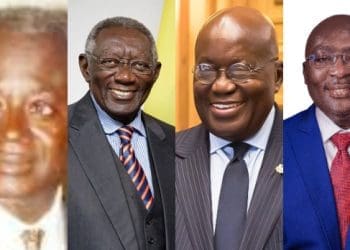The Government of Ghana has declared three days of national mourning following the passing of former First Lady, Nana Konadu Agyeman-Rawlings, a prominent stateswoman and advocate for women’s empowerment.
According to an official statement issued by the Presidency Communications Directorate, President John Dramani Mahama announced that the mourning period will run from Friday, October 24, to Sunday, October 26, 2025, for Konadu Agyeman-Rawlings.
During this time, all national flags are to be flown at half-mast across public buildings, diplomatic missions, and government installations both in Ghana and abroad.
The statement described the declaration as a tribute to Mrs Agyeman-Rawlings’ “distinguished service to the nation” and her unwavering commitment to issues of women’s empowerment, child welfare, and social development.
“The Government extends its deepest condolences to the family, her children, and all who mourn this irreplaceable loss. May her soul rest in perfect peace,” the statement concluded.
Mrs Agyeman-Rawlings, wife of the late former President Jerry John Rawlings, served as Ghana’s First Lady from 1981 to 2001 and was widely regarded as one of the most influential figures in Ghana’s political and social development landscape.
The country is mourning the loss of Nana Konadu Agyeman-Rawlings, whose death has drawn a nationwide outpouring of grief and tributes from political leaders, diplomats, public institutions, and citizens across the world.
Nana Konadu Agyeman-Rawlings: The end of an era
Born on November 17, 1948, in Cape Coast in the Central Region, Nana Konadu Agyeman-Rawlings received her early education at Achimota School before pursuing a degree in Art and Design at the University of Science and Technology, now Kwame Nkrumah University of Science and Technology (KNUST).
It was during her university years that she met Flight Lieutenant Jerry John Rawlings, the man who would become both her husband and a transformative figure in Ghana’s political history. The two married in 1977.
Her life took a historic turn when her husband led the June 4, 1979, uprising and later the 31st December Revolution in 1981—two defining moments that reshaped Ghana’s political landscape.
As First Lady during both the Provisional National Defence Council (PNDC) era and the subsequent Fourth Republic, Nana Konadu became one of the most visible and influential women in national affairs.
She championed causes of social development, women’s empowerment, and economic inclusion, establishing herself as a formidable force in governance.
In 1982, she founded the 31st December Women’s Movement (DWM)—a groundbreaking organisation dedicated to improving the lives of women, particularly in rural communities. Under her leadership, the movement established preschools, launched microcredit schemes, and championed women’s participation in decision-making at all levels.
The DWM quickly grew into one of Africa’s most dynamic women’s organisations, leaving a lasting legacy of empowerment and reform. Its influence helped shape landmark national policies, including the inclusion of women’s rights in the 1992 Constitution and the Intestate Succession Law (PNDC Law 111), which protected the inheritance rights of spouses and children—an unprecedented step toward gender equity in Ghana.
Beyond her role as First Lady, Nana Konadu was an independent political actor in her own right. In 2011, she made history by challenging then-President John Evans Atta Mills in the National Democratic Congress (NDC) presidential primaries—a bold move that underscored her conviction and political independence.
She later founded the National Democratic Party (NDP) in 2012, becoming its first presidential candidate. Though her presidential bids in 2012 and 2016 were unsuccessful, her determination inspired a generation of women to envision themselves in positions of political power.
Known for her elegance, intellect, and unwavering confidence, Nana Konadu Agyeman-Rawlings remained a passionate advocate for social justice, gender equality, and national unity throughout her life.
She was married to Jerry John Rawlings, Ghana’s longest-serving head of state, for over four decades until his passing in November 2020. Together, they raised four children, including Dr Zanetor Agyeman-Rawlings, the Member of Parliament for Korle Klottey.
Her passing marks the end of an era—the close of a defining chapter in Ghana’s political and social evolution. Tributes have poured in from across the nation, honouring her as a visionary leader who redefined the role of women in public life and helped shape Ghana’s transition from military rule to democracy.
Funeral arrangements, the family has announced, will be communicated in due course.












